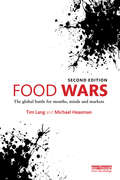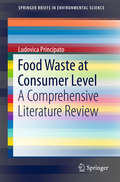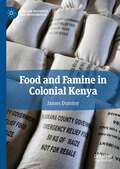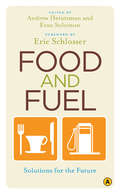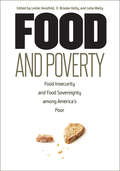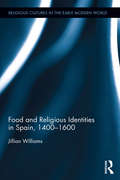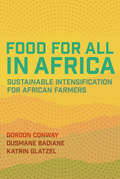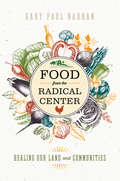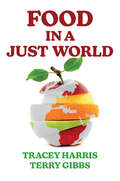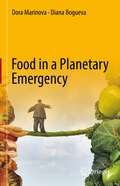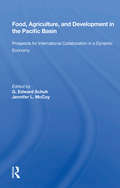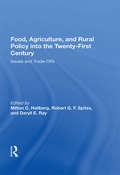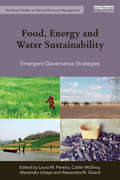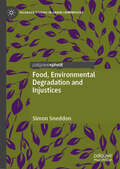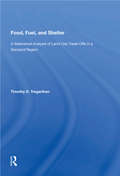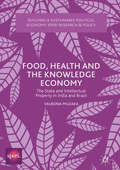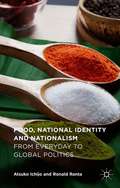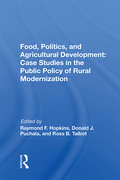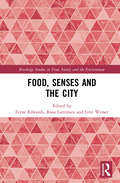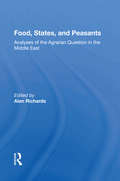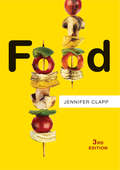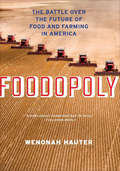- Table View
- List View
Food Wars: The Global Battle for Mouths, Minds and Markets
by Tim Lang Michael HeasmanIn the years since publication of the first edition of Food Wars much has happened in the world of food policy. This new edition brings these developments fully up to date within the original analytical framework of competing paradigms or worldviews shaping the direction and decision-making within food politics and policy. The key theme of the importance of integrating human and environmental health has become even more pressing. In the first edition the authors set out and brought together the different strands of emerging agendas and competing narratives. The second edition retains the same core structure and includes updated examples, case studies and the new issues which show how these conflicting tendencies have played out in practice over recent years and what this tells us about the way the global food system is heading. Examples of key issues given increased attention include: nutrition, including the global rise in obesity, as well as chronic conditions, hunger and under-nutrition the environment, particularly the challenges of climate change, biodiversity loss, water stress and food security food industry concentration and market power volatility and uncertainty over food prices and policy responses tensions over food, democracy and citizenship social and cultural aspects impacting food and nutrition policies.
Food Waste at Consumer Level: A Comprehensive Literature Review (SpringerBriefs in Environmental Science)
by Ludovica PrincipatoThis book presents what is the state-of-the-art in the field of the food waste phenomenon at consumer level, including a thorough literature review, and it highlights trends in the field. It provides a comprehensive starting point for future research. Food waste represents a major public policy issue, which is included in the UN Sustainable Development Goals. In this context, the present work identifies the most important definitions given to food waste and its environmental, social and economic impacts. With a comprehensive literature review that covers a forty-year time span (1977-2017), this book highlights the multiple, complex facets of food waste at the consumer level. Drawing from behavioural and marketing theories, it proposes a new theoretical framework with the aim to better explain food waste behaviour. Extensive research is being carried out on the main worldwide initiatives (both public and private) and food policies aimed at tackling the phenomenon.
Food and Famine in Colonial Kenya (African Histories and Modernities)
by James DuminyThis book offers a genealogical critique of how food scarcity was governed in colonial Kenya. With an approach informed by the ‘analysis of government’, the study accounts for the emergence and persistence of dominant approaches to promoting food security in Kenya and elsewhere in Africa – policies and practices that prioritize increased agricultural production as the principal means of achieving food security. Drawing on a range of archival sources, the book investigates how those tasked with governing colonial Kenya confronted food as a particular kind of problem. It emphasizes the ways in which that problem shifted in conjunction with the emergence and consolidation of the colonial state and economic relations in the territory. The book applies a novel conceptual approach to the historical study of African food systems and famine, and provides the first longitudinal and in-depth analysis of the dynamics of food scarcity and its government in Kenya.
Food and Fuel: Solutions for the Future
by Evan Solomon Andrew HeintzmanThe twenty-first century has been dominated by two major global crises: a scarcity of food and fuel. Both have had detrimental effects on the environment and both are at the root of the fragile health of the global economy. Combining the best of the critically acclaimed Fuelling the Future and Feeding the Future, this timely and provocative collection of essays from leading thinkers such as Thomas Homer-Dixon, Gordon Laird, Jeremy Rifkin, Frances Moore Lappe, and Anna Lappe offers valuable strategies to combat global famine and fast-food fat; business models for sustainable food production and power sources; and descriptions of emerging technologies and sciences.
Food and Poverty: Food Insecurity and Food Sovereignty among America's Poor
by Leslie Hossfeld E. Brooke Kelly Julia WaityFood insecurity rates, which skyrocketed with the Great Recession, have yet to fall to pre-recession levels. Food pantries are stretched thin, and states are imposing new restrictions on programs like SNAP that are preventing people from getting crucial government assistance. At the same time, we see an increase in obesity that results from lack of access to healthy foods. The poor face a daily choice between paying bills and paying for food.
Food and Poverty: Food Insecurity and Food Sovereignty among America's Poor
by Leslie H. Hossfeld, E. Brooke Kelly, and Julia F. WaityFood insecurity rates, which skyrocketed with the Great Recession, have yet to fall to pre-recession levels. Food pantries are stretched thin, and states are imposing new restrictions on programs like SNAP that are preventing people from getting crucial government assistance. At the same time, we see an increase in obesity that results from lack of access to healthy foods. The poor face a daily choice between paying bills and paying for food.
Food and Power: Regime Type, Agricultural Policy, and Political Stability
by Henry ThomsonThe relationship between development and democratization remains one of the most compelling topics of research in political science, yet many aspects of authoritarian regime behavior remain unexplained. This book explores how different types of governments take action to shape the course of economic development, focusing on agriculture, a sector that is of crucial importance in the developing world. It explains variation in agricultural and food policy across regime type, who the winners and losers of these policies are, and whether they influence the stability of authoritarian governments. The book pushes us to think differently about the process linking economic development to political change, and to consider growth as an inherently politicized process rather than an exogenous driver of moves towards democracy.
Food and Religious Identities in Spain, 1400-1600 (Religious Cultures in the Early Modern World)
by Jillian WilliamsIn the late fourteenth century, the Iberian Peninsula was home to three major religions which coexisted in relative peace. Over the next two centuries, various political and social factors changed the face of Iberia dramatically. This book examines this period of dynamic change in Iberian history through the lens of food and its relationship to religious identity. It also provides a basis for further study of the connection between food and identities of all types. This study explores the role of food as an expression of religious identity made evident in things like fasting, feasting, ingredient choices, preparation methods and commensal relations. It considers the role of food in the formation and redefinition of religious identities throughout this period and its significance in the maintenance of ideological and physical boundaries between faiths. This is an insightful and unique look into inter-religious dynamics. It will therefore be of great interest to scholars of religious studies, early modern European history and food studies.
Food for All in Africa: Sustainable Intensification for African Farmers
by Ousmane Badiane Gordon Conway Katrin GlatzelAfrica requires a new agricultural transformation that is appropriate for Africa, that recognizes the continent's diverse environments and climates, and that takes into account its histories and cultures while benefiting rural smallholder farmers and their families.In this boldly optimistic book, Sir Gordon Conway, Ousmane Badiane, and Katrin Glatzel describe the key challenges faced by Africa's smallholder farmers and present the concepts and practices of Sustainable Intensification (SI) as opportunities to sustainably transform Africa's agriculture sector and the livelihoods of millions of smallholders. The way forward, they write, will be an agriculture sector deeply rooted within SI: producing more with less, using fertilizers and pesticides more prudently, adapting to climate change, improving natural capital, adopting new technologies, and building resilience at every stage of the agriculture value chain.Food for All in Africa envisions a virtuous circle generated through agricultural development rooted in SI that results in greater yields, healthier diets, improved livelihoods for farmers, and sustainable economic opportunities for the rural poor that in turn generate further investment. It describes the benefits of digital technologies for farmers and the challenges of transforming African agricultural policies and creating effective and inspiring leadership.Food for All in Africa demonstrates why we should take on the challenge and provides ideas and methods through which it can be met.
Food from the Radical Center: Healing Our Land and Communities
by Gary Paul Nabhan"Informational and inspirational."—BooklistAmerica has never felt more divided. But in the midst of all the acrimony comes one of the most promising movements in our country's history. People of all races, faiths, and political persuasions are coming together to restore America's natural wealth: its ability to produce healthy foods.In Food from the Radical Center, Gary Nabhan tells the stories of diverse communities who are getting their hands dirty and bringing back North America's unique fare: bison, sturgeon, camas lilies, ancient grains, turkeys, and more. These efforts have united people from the left and right, rural and urban, faith-based and science-based, in game-changing collaborations. Their successes are extraordinary by any measure, whether economic, ecological, or social. In fact, the restoration of land and rare species has provided—dollar for dollar—one of the best returns on investment of any conservation initiative.As a leading thinker and seasoned practitioner in biocultural conservation, Nabhan offers a truly unique perspective on the movement. He draws on fifty years of work with community-based projects around the nation, from the desert Southwest to the low country of the Southeast. Yet Nabhan's most enduring legacy may be his message of hope: a vision of a new environmentalism that is just and inclusive, allowing former adversaries to commune over delicious foods.
Food in a Just World: Compassionate Eating in a Time of Climate Change
by Tracey Harris Terry GibbsFood in a Just World examines the violence, social breakdown, and environmental consequences of our global system of food production, distribution, and consumption, where each step of the process is built on some form of exploitation. While highlighting the broken system’s continuities from European colonialism, the authors argue that the seeds of resilience, resistance, and inclusive cultural resurgence are already being reflected in the day-to-day actions of communities around the world. Calling for urgent change, the book looks at how genuine democracy would give individuals and communities meaningful control over the decisions that impact their lives when seeking to secure humanely this most basic human need. Drawing on the perspectives of advocates, activists, workers, researchers, and policymakers, Harris and Gibbs explore the politics of food in the context of capitalist globalization and the climate crisis, uncovering the complexities in our relationships with one another, with other animals, and with the natural world.
Food in a Planetary Emergency
by Dora Marinova Diana BoguevaThis book Food in a Planetary Emergency is a timely overview of the current food systems and the required transformations to respond to the challenges of climate change, population pressures, biodiversity loss and use of natural resources, such as soils, water and phosphorus. This book takes a planetary health perspective which explores the links between natural systems and human wellbeing implying that there is need for united actions to achieve important environmental and population health co-benefits.This book outlines that the foundation of planetary health is sustainability. It addresses environment and climate change emergency as a global agenda, however, emphasises the urgency of the sustainability perspective which integrates a wide spectrum of issues that require integrated solutions to offer better prospects for humanity. This book drives this argument further through the global Sustainable Development Goals (SDGs) where food is not just SDG2 but transcends all 17 goals.This book tackles the problems of food production and consumption at a global, industry and individual level linking it to topics related to the natural environment, climate change, waste, marketing, new ways of producing food and providing alternative proteins, mitigating non-communicable diseases, flexitarianism and the role of Generation Z in the emerging dietary choices.This book benefits readers with understanding the importance and intricacy of their dietary choices at a point in time when our planet is facing an emergency triggered by long-term dependence on fossil fuels and artificial fertilisers but also by the ways we have provided food. However, this book also delivers the message that safeguarding and sustaining planetary health is possible.
Food, Agriculture, And Development In The Pacific Basin: Prospects For International Collaboration In A Dynamic Economy
by G. Edward SchuhThis book is concerned with the management of food production and the distribution of food in the Pacific Basin, exploring food's potential for engendering both increased conflict and cooperation in the region. The authors begin by discussing the role of food and agriculture in the international economy and the implications of two contrasting approaches to food security: international trade and self-sufficiency. They also consider the problem of international migration of labor in the region and look at how agriculture can contribute to the development of the economy in individual countries. The book concludes with a discussion of the prospects for international collaboration in dealing with the domestic and international adjustments required to enhance overall growth and equity in food supply and distribution.
Food, Agriculture, And Rural Policy Into The Twenty-first Century: Issues And Trade-offs
by Milton C. Hallberg Robert G. F. Spitze Daryll E. RayThis book contributes to 1995 policymaking by offering information concerning an array of issues fundamentally important to the U.S. agricultural and food sector. It reviews a set of policy approaches for dealing with these issues, and assesses trade-offs among these alternative approaches.
Food, Energy and Water Sustainability: Emergent Governance Strategies (Earthscan Studies in Natural Resource Management)
by Laura M. Pereira Caitlin A. McElroy Alexandra Littaye Alexandra M. GirardSocieties around the world face an increasingly uncertain future as social and ecological changes create pressure on resource governance, and this uncertainty calls for new models that illuminate the intersections of civil society, public sector, and private sector resource management. This volume presents a diversity of collaborations between various governance actors in the management of the Food-Energy-Water (FEW) nexus. It analyses the ability of emergent governance structures to cope with the complexity of future challenges across FEW systems. Divided into two sections, chapters in the first half of the book present a collection of case studies from around the world exemplifying how FEW nexus challenges are addressed in a multitude of ways and by a variety of actors. Chapters in the second half offer broader perspectives on the management of FEW and underline the lessons that emerge from applying a FEW lens to the question of natural resource governance. The varied examples in this book highlight that the management of FEW is often a question of reinventing, adapting, and building upon existing practices. Such practices are deeply embedded in unique socio-cultural, environmental, and political contexts as well as ‘hard’ infrastructures. Most of all, this edited volume seeks to communicate the wealth of ideas from committed individuals who continue to work to improve natural resource governance and our sustainable futures.
Food, Environmental Degradation and Injustices: How the Way We Eat Will Destroy Us (Palgrave Studies in Green Criminology)
by Simon SneddonWhat if the global trade in key food commodities suddenly ceased? This book takes readers on a thought-provoking journey through the environmental, ethical, and social justice issues embedded in our food systems. From meat and seafood to staple crops like tomatoes, potatoes, palm oil, and soya, it explores how industrial agriculture and aquaculture drive deforestation, biodiversity loss, labour exploitation, and species injustice. Drawing on green criminology and eco-justice principles, the book uncovers how corporations, weak regulations, and economic inequalities sustain harmful practices—often legally sanctioned but morally indefensible. Through an innovative &“what-if&” approach, it challenges readers to rethink the true cost of their food and the power of their choices. This compelling book is essential reading for anyone concerned with sustainability, corporate accountability, and the future of global food production.
Food, Fuel & Shelter/h
by Timothy D. TregarthenAs human pressures on land intensify, land-use decisions in response to the new demands become increasingly critical. Thus, the fate of the little-known Running Creek Watershed assumes a broad importance. Running Creek Watershed is a 150-kilometer strip of land lying just east of the rapidly expanding urban corridor of Colorado's front range. The land in the watershed is devoted primarily to the production of food, and includes pasture, dry crop, and irrigated crop operations. Two sources of demand suggest dramatic future changes in this land-use pattern: advancing urbanization, and energy demands for the coal available in a large deposit 25 kilometers east of Denver. In this volume Timothy Tregarthen presents a synthesis of discussions and papers presented at a 1976 conference that focused on the trade-offs implicit in the land-use alternatives of food production, urbanization, and energy development. Sponsored by the Wright-Ingraham Institute, the conference brought together a wide range of scientists, humanists, public officials, representatives of industrial and agricultural organizations, and interested citizens concerned not only about this important regional problem, but about the broader implications of competing land-use needs. Conference participants examined factors important to changes in land use, giving particular attention to the natural, economic, political, and value systems at work on the watershed in terms of how these systems affect and will be affected by changing land-use patterns.
Food, Health and the Knowledge Economy: The State and Intellectual Property in India and Brazil (Building a Sustainable Political Economy: SPERI Research & Policy)
by Valbona MuzakaThis book opens a window into how two ambitious countries – India and Brazil – are seeking to become knowledge powers in the 21st century. As the knowledge economy became the preferred way of conceptualising the economy and its future direction, in the more economically-advanced countries, our search for understanding also followed the same direction. This generated a body of work that has neglected countries that, like India and Brazil, are attempting to make the leap into knowledge economies. Muzaka explores these motivations and the ways in which they have inspired a number of institutional reforms in India and Brazil. The author offers an investigation of the role the state in shaping the respective intellectual property systems pertaining to the pharmaceutical and agro-biotechnology sectors and the multiple social conflicts that have unfolded as a result.
Food, National Identity and Nationalism: From Everyday to Global Politics
by Atsuko Ichijo Ronald RantaExploring a much neglected area, the relationship between food and nationalism, this book examines a number of case studies at various levels of political analysis to show how useful the food and nationalism axis can be in the study of politics.
Food, National Identity and Nationalism: From Everyday to Global Politics
by Atsuko Ichijo Ronald RantaExploring a much neglected area, the relationship between food and nationalism, this book examines a number of case studies at various levels of political analysis to show how useful the food and nationalism axis can be in the study of politics.
Food, Politics, And Agricultural Development: Case Studies In The Public Policy Of Rural Modernization
by Donald J. Puchala Raymond F. Hopkins Ross B. TalbotThis collection of studies on the politics of agricultural development in regions of Asia and Africa emphasizes the need for steady and significant increases in food production in the developing countries. It is a set of exercises in the comparative analysis of agricultural modernization policies.
Food, Senses and the City (Routledge Studies in Food, Society and the Environment)
by Ferne Edwards Roos Gerritsen Grit WesserThis work explores diverse cultural understandings of food practices in cities through the senses, drawing on case studies in the Americas, Asia, Australia, and Europe. The volume includes the senses within the popular field of urban food studies to explore new understandings of how people live in cities and how we can understand cities through food. It reveals how the senses can provide unique insight into how the city and its dwellers are being reshaped and understood. Recognising cities as diverse and dynamic places, the book provides a wide range of case studies from food production to preparation and mediatisation through to consumption. These relationships are interrogated through themes of belonging and homemaking to discuss how food, memory, and materiality connect and disrupt past, present, and future imaginaries. As cities become larger, busier, and more crowded, this volume contributes to actual and potential ways that the senses can generate new understandings of how people live together in cities. This book will be of great interest to students and scholars of critical food studies, urban studies, and socio-cultural anthropology.
Food, States, And Peasants: Analyses Of The Agrarian Question In The Middle East
by Alan RichardsOne of the most serious problems facing the Middle East and North Africa · is the region's growing inability to feed its expanding population. Rapidly escalating demand has made the region highly dependent on food imports, and policy initiatives intended to increase domestic production have met with mixed success at best. The contributors to this volume examine the historical origins of state policies toward agriculture, recent policy changes and their effects on domestic supply, and the social and political implications of these shifts. Focusing on the region's largest agricultural economies, contributors analyze Turkey's strong performance as well as Egypt's weak response to its agricultural problems. Pricing, investment strategies, irrigation policies, and the impact of large-scale labor migration on agricultural sectors are discussed, and a common theme of the interplay between politics and economics runs throughout.
Food: Governance Challenges And Opportunities (Resources)
by Jennifer ClappWe all need food to survive, and forty percent of the world’s population relies on agriculture for their livelihood. Yet control over food is concentrated in relatively few hands. Turmoil in the world food economy in recent decades has highlighted a number of vulnerabilities and contradictions inherent in the way we currently organize this vital sector. Extremes of both undernourishment and overnourishment affect a significant proportion of humanity. And attempts to increase production through the spread of an industrial model of agriculture has resulted in serious ecological consequences. The fully revised and expanded third edition of this popular book explores how the rise of industrial agriculture, corporate control, inequitable agricultural trade rules, and the financialization of food have each enabled powerful actors to gain fundamental influence over the practices that dominate the world food economy and result in uneven consequences for both people and planet. A variety of movements have emerged that are making important progress in establishing alternative food systems, but, as Clapp’s penetrating analysis ably shows, significant challenges remain.
Foodopoly: The Battle Over the Future of Food and Farming in America
by Wenonah Hauter&“A meticulously researched tour de force&” on politics, big agriculture, and the need to go beyond farmers&’ markets to find fixes (Publishers Weekly). Wenonah Hauter owns an organic family farm that provides healthy vegetables to hundreds of families as part of the Community Supported Agriculture (CSA) movement. Yet, as a leading healthy-food advocate, Hauter believes that the local food movement is not enough to solve America&’s food crisis and the public health debacle it has created. In Foodopoly, she takes aim at the real culprit: the control of food production by a handful of large corporations—backed by political clout—that prevents farmers from raising healthy crops and limits the choices people can make in the grocery store. Blending history, reporting, and a deep understanding of farming and food production, Foodopoly is a shocking, revealing account of the business behind the meat, vegetables, grains, and milk most Americans eat every day, including some of our favorite and most respected organic and health-conscious brands. Hauter also pulls the curtain back from the little-understood but vital realm of agricultural policy, showing how it has been hijacked by lobbyists, driving out independent farmers and food processors in favor of the likes of Cargill, Tyson, Kraft, and ConAgra. Foodopoly shows how the impacts ripple far and wide, from economic stagnation in rural communities to famines overseas, and argues that solving this crisis will require a complete structural shift—a change that is about politics, not just personal choice.
